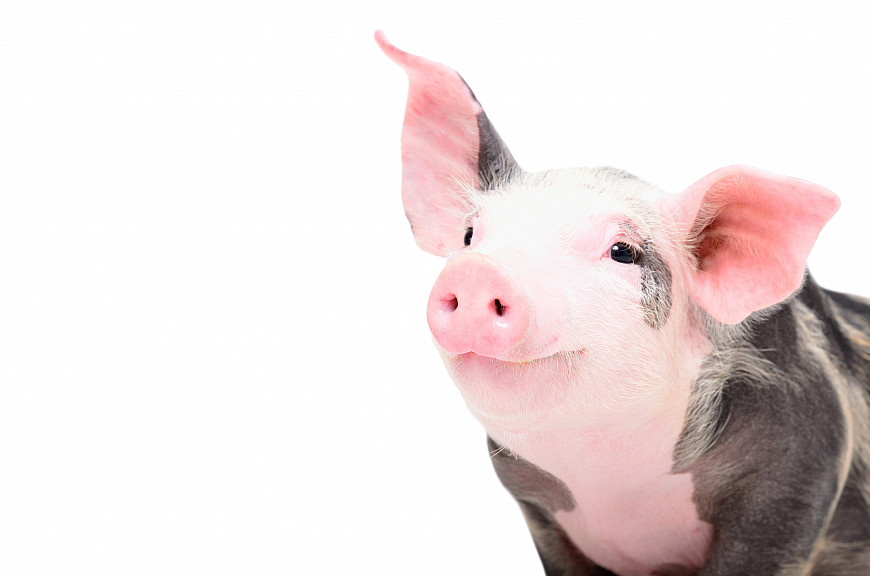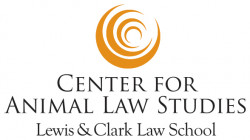Shaping the Future of Farmed Animal Advocacy
Since 1983, October 2nd has been recognized as an international day of observance for farmed animals. Every day, Lewis & Clark Law School’s faculty, staff, students, and alumni are engaged in tireless efforts to ensure that animals raised in intensive farming operations worldwide have a better life and a kind future.

On this World Farmed Animals Day, the Center for Animal Law Studies (CALS) is raising awareness and showcasing some of this impactful work and why our students are passionate about farmed animal advocacy.
Why Farmed Animals?
When we think of animals on farms, most people still conjure up images from childhood books depicting rolling fields, frolicking animals, and a life of freedom and joy. That image is not reflective of how the vast majority of farmed animals are raised. Rather, the sheer scale of suffering existing within the industrial animal agriculture and aquaculture systems is staggering. In the United States alone, 99% of farmed animals are raised on factory farms, with an estimated 165 million pigs, cows, and sheep, and 8 billion chickens slaughtered annually. Globally, approximately 82 billion animals were slaughtered in 2024. These numbers do not account for aquatic animals, as they are not even considered individuals and their lives are measured in tons.
Animals raised in intensive confinement, whether terrestrial or aquatic, are deprived of any semblance of environmental enrichment or ability to exercise their natural behaviors. Terrestrial farmed animals are routinely subjected to procedures such as dehorning, debeaking or castration without anesthesia, and may spend the majority of their short lives in battery cages (in the case of chickens) or gestation crates (in the case of pigs), which are too small for them to stand up and turn around in. Additionally, farmed animals are usually separated from their families far earlier than would occur in nature and through means that cause immense distress. Overcrowding is also a serious issue in aquaculture, and aquatic animals are susceptible to diseases, high injury rates and increased aggression due to their conditions of confinement.
The manner in which we raise animals in intensive confinement is not only bad for the animals, but also impacts humans, especially poor communities and communities of color. For example, concentrated animal feeding operations (CAFOs) are disproportionately located in or around communities of concern. Slaughterhouse workers, many of whom are immigrants, face some of the most dangerous and exploitative work conditions anywhere in the United States. Additionally, child labor has been documented in the meatpacking industry in the United States,where, for example, a major food safety sanitation company paid $1.5 million in penalties in 2023 for employing more than 100 teenagers in dangerous jobs at meatpacking plants across eight states.
The system also causes direct environmental and public health harms. The meat and dairy industries have a significant contribution to environmental destruction and climate change. Animal-based foods are responsible for up to 20% of global anthropogenic greenhouse gas emissions, and farmed animals are responsible for up to 32% of global anthropogenic methane emissions. Additionally, agriculture, whether to farm animals or to grow crops that are later fed to animals, is the biggest driver of deforestation and biodiversity loss. CAFOs in the United States also contribute to both water and air pollution, adversely impacting human health and destroying ecosystems.
As we advocate for farmed animals, their interests are intertwined with ours as human beings who are invested in safe working conditions; public health; clean air, water, and soil, the reduction of greenhouse gas emissions, and more. Farmed animal advocacy is instrumental to raising awareness and challenging the factory farming system that causes so much suffering and devastation to animals, humans, and the planet.
CALS’ Commitment to Farmed Animal Protection
At CALS, we’re proud to be at the forefront of farmed animal advocacy. Lewis & Clark Law School offer courses to address the many substantive legal issues that are germane to challenging the system, such as Aquatic Animal Law, taught by Professor Hira Jaleel, and Industrial Animal Agriculture Law taught by Professor Joyce Tischler, who is co-authoring the world’s first legal casebook about Industrial Animal Agriculture Law & Policy.
Lewis & Clark students (JD, and Animal Law LLM and MSL) also engage in hands-on experiential learning devoted to advancing protections for farmed animals in the Farmed Animal Protection Project, led by Professor Hira Jaleel, who is also a Lewis & Clark Animal Law LLM alumna. In this year-long experiential learning course, students pursue projects aimed at protecting farmed animals through the legal system, and critically evaluate various farmed animal protection strategies, such as legislative reform, litigation, rulemaking petitions and corporate engagement. In addition to learning from Professor Jaleel, students in the Project also engage with a roster of impressive farmed animal experts through guest lectures. At the end of the academic year, projects produced through the FAPP are shared with the public to increase awareness and to aid other farmed animal advocacy efforts within the animal protection movement.
“Learning about how farmed animals suffer in industrial agriculture and aquaculture operations—and how the law often enables this suffering—can be quite disheartening,” says Professor Jaleel. “Through the Farmed Animal Protection Project, students gain hands-on experience advocating for farmed animals through various projects, translating their passion into meaningful action.”
Students enrolled in the Farmed Animal Protection Project shared why they are passionate about helping farmed animals:
- “Factory farming is the largest source of animal abuse in the world, with more than 23 million land animals killed every day in the U.S. alone. When we connect with animals, we see that they are sentient beings who value their lives, feel pain, and can suffer. There is no humane way to kill an animal who does not want to die; thus, our moral obligations to remove ourselves as active participants in cruelty rise above the preferences of our palates.” - Brittany Bennett (2L)
- “Society’s attitude toward farmed animals is “out of sight, out of mind.” In truth, they live in physical and emotional agony, perpetuated by a dearth of legislation and regulation, coupled with corporate greed. Our work at FAPP illuminates this reality and strives toward a more humane future.” - Miranda Herreid (3L)
- “Beneath the luxury facade of crocodile-skin handbags and designer shoes in Zimbabwe lies a grim reality: animals suffering in cramped, filthy farms. Is the price of fashion worth the cost of suffering? It’s time to dismantle the cruel practices of the crocodile farming industry and create a landscape where style and ethics coexist.” - Oswald Marondedze (LLM Candidate 2025, Zimbabwe).
- “I have always felt a strong connection to animals and advocating for their independence and well-being feels as important to me as advocating for another human being. Animals subjected to industrial animal agriculture are robbed of their freedom and forced to endure immense suffering against their will. I fight for them because they have intrinsic value and deserve quality of life just like humans do.” - Sarah Rae (3L)
- “I was in veterinary school the first time I witnessed how chickens in intensive systems are raised. As I went into the barn, the clock stopped—despair disarmed me. One of the hens turned to look at me and in the middle of this madness, I felt a deep connection. It is an honor and a privilege to listen to their truth, to be their advocate.” - Valeria Picazo Zamarripa (MSL Candidate 2025, Mexico).
Our alumni around the world also continue that work so a better life for farmed animals can be a reality and to reduce the spread of the harmful CAFO and intensive farming systems.
What You Can Do
What can you personally do to protect farmed animals? We’re glad you asked! There is so much we can individually do to improve the lives of farmed animals. A few examples include:
- Study farmed animal protection with us at CALS. The Animal Law Program at Lewis & Clark Law School serves JD students, as well as post-graduate students seeking an LLM (for lawyers) and MSL (for nonlawyers), with the LLM and MSL offered in-person and online.
- Support CALS’ work advancing farmed animal protections, whether through sharing this blog, joining our mailing list, or following us on social media.
- Donate to CALS to support our work training the next generation of farmed animal attorneys, legislators, and changemakers. As a self-funded Center within the law school, CALS is able to provide these unique opportunities for farmed animal advocates through the generosity of our donors.
- Register for this year’s Animal Law Conference, taking place from October 18-20, 2024. You can attend either in person (in Portland), or virtually. Numerous panels relate to farmed animal advocacy, including a panel featuring two of our LLM alumni, Cynthia von Schlichten and Jamie McLaughlin.
- Demand protections for better treatment, well-being, and more natural conditions that meet the animals’ behavioral and physical needs.
- Support legislation at the local, state, and federal levels that advance the protections for farmed animals and the others exploited by the industrial food system – including the workers, the communities neighboring CAFOs, and the planet. And, oppose legislation that does not.
- Make compassionate choices about what you eat and wear, and consider whether those choices contribute to suffering. You can support our legal work by making dietary and lifestyle choices rooted in compassion for animals, people, and the environment.
As individuals, we have the power in our daily lives to ease the suffering of farmed animals and support a kinder and more humane world through our choices. Please join us as we fight for a better world for all animals, including farmed animals.
The Center for Animal Law Studies (CALS) was founded in 2008 with a mission to educate the next generation of animal law advocates and advance animal protection through the law. With vision and bold risk-taking, CALS has since developed into a world-renowned animal law epicenter. CALS’ Alumni-in-Action from 30 countries are making a difference for animals around the world. CALS is a self-funded Center within the law school operating under the Lewis & Clark College 501(c)(3) tax-exempt status, and is able to provide these educational opportunities through donations and grants.
More Center for Animal Law Studies Stories
Center for Animal Law Studies is located in Wood Hall on the Law Campus.
MSC: 51
email cals@lclark.edu
voice 503-768-6960
Center for Animal Law Studies
Lewis & Clark Law School
10101 S. Terwilliger Boulevard MSC 51
Portland OR 97219


